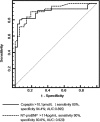Higher copeptin levels are associated with worse outcome in patients with hypertrophic cardiomyopathy
- PMID: 27768229
- PMCID: PMC6490334
- DOI: 10.1002/clc.22602
Higher copeptin levels are associated with worse outcome in patients with hypertrophic cardiomyopathy
Abstract
Background: Correlation of increased copeptin levels with various cardiovascular diseases has been described. The clinical use of copeptin levels in patients with hypertrophic cardiomyopathy (HCM) has not been investigated before.
Hypothesis: In this study, we aimed to investigate the prognostic value of copeptin levels in patients with hypertrophic cardiomyopathy (HCM).
Methods: HCM was defined as presence of left ventricular wall thickness ≥15 mm in a subject without any concomitant disease that may cause left ventricular hypertrophy. Levels of copeptin and plasma N-terminal probrain natriuretic peptide (NT-proBNP) were evaluated prospectively in 24 obstructive HCM patients, 36 nonobstructive HCM patients, and 36 age- and sex-matched control subjects. Blood samples were collected in the morning between 7 and 9 am after overnight fasting. Patients were followed for 24 months. Hospitalization with diagnosis of heart failure/arrhythmia, implantable cardioverter-defibrillator implantation, and cardiac mortality were accepted as adverse cardiac events.
Results: Copeptin and NT-proBNP levels were higher in the HCM group compared with controls (14.1 vs 8.4 pmol/L, P < 0.01; and 383 vs 44 pg/mL, P < 0.01, respectively). Copeptin and NT-proBNP levels were higher in the obstructive HCM subgroup compared with the nonobstructive HCM subgroup (18.3 vs 13.1 pmol/L, P < 0.01; and 717 vs 223 pg/mL, P < 0.01, respectively). In multivariable logistic regression analysis, copeptin and NT-proBNP levels remained as independent predictors of heart failure (P < 0.01 for both) and adverse cardiac events (P < 0.01 for both).
Conclusions: Copeptin and NT-proBNP levels were significantly higher in patients with obstructive HCM, and higher levels were associated with worse outcome.
Keywords: Cardiovascular; Heart failure/cardiac transplantation/cardiomyopathy/myocarditis; Imaging; biochemistry; echocardiography.
© 2016 Wiley Periodicals, Inc.
Conflict of interest statement
The authors declare no potential conflicts of interest.
Figures


Similar articles
-
Prognostic value of N-terminal pro-brain natriuretic Peptide in outpatients with hypertrophic cardiomyopathy.Am J Cardiol. 2013 Oct 15;112(8):1190-6. doi: 10.1016/j.amjcard.2013.06.018. Epub 2013 Jul 19. Am J Cardiol. 2013. PMID: 23871673
-
Mid-regional proatrial natriuretic peptide for predicting prognosis in hypertrophic cardiomyopathy.Heart. 2020 Feb;106(3):196-202. doi: 10.1136/heartjnl-2019-314826. Epub 2019 Jul 26. Heart. 2020. PMID: 31350276
-
Degree and distribution of left ventricular hypertrophy as a determining factor for elevated natriuretic peptide levels in patients with hypertrophic cardiomyopathy: insights from cardiac magnetic resonance imaging.Int J Cardiovasc Imaging. 2012 Apr;28(4):763-72. doi: 10.1007/s10554-011-9876-4. Epub 2011 Apr 24. Int J Cardiovasc Imaging. 2012. PMID: 21516440
-
Mavacamten: a novel small molecule modulator of β-cardiac myosin for treatment of hypertrophic cardiomyopathy.Expert Opin Investig Drugs. 2020 Nov;29(11):1171-1178. doi: 10.1080/13543784.2020.1821361. Epub 2020 Sep 20. Expert Opin Investig Drugs. 2020. PMID: 32897741 Review.
-
Genotype-phenotype correlations in hypertrophic cardiomyopathy: Insights from an HCM Center of Excellence.Curr Probl Cardiol. 2025 Apr;50(4):102996. doi: 10.1016/j.cpcardiol.2025.102996. Epub 2025 Jan 29. Curr Probl Cardiol. 2025. PMID: 39890042 Review.
Cited by
-
Follow-up and prognosis of HCM.Glob Cardiol Sci Pract. 2018 Aug 12;2018(3):33. doi: 10.21542/gcsp.2018.33. Glob Cardiol Sci Pract. 2018. PMID: 30393645 Free PMC article. Review. No abstract available.
-
Higher Copeptin Levels are Associated with the Risk of Atrial Fibrillation in Patients with Rheumatic Mitral Stenosis.Acta Cardiol Sin. 2021 Jul;37(4):412-419. doi: 10.6515/ACS.202107_37(4).20210111A. Acta Cardiol Sin. 2021. PMID: 34257491 Free PMC article.
-
Biomarkers in heart failure: the past, current and future.Heart Fail Rev. 2019 Nov;24(6):867-903. doi: 10.1007/s10741-019-09807-z. Heart Fail Rev. 2019. PMID: 31183637 Review.
-
Circulating Biomarkers in Hypertrophic Cardiomyopathy.J Am Heart Assoc. 2022 Dec 6;11(23):e027618. doi: 10.1161/JAHA.122.027618. Epub 2022 Nov 16. J Am Heart Assoc. 2022. PMID: 36382968 Free PMC article. Review.
-
Obstructive hypertrophic cardiomyopathy: from genetic insights to a multimodal therapeutic approach with mavacamten, aficamten, and beyond.Egypt Heart J. 2024 Dec 7;76(1):156. doi: 10.1186/s43044-024-00587-y. Egypt Heart J. 2024. PMID: 39645546 Free PMC article. Review.
References
-
- Maron MS, Olivotto I, Zenovich AG, et al. Hypertrophic cardiomyopathy is predominantly a disease of left ventricular outflow tract obstruction. Circulation. 2006;114:2232–2239. - PubMed
-
- Arteaga E, Araujo AQ, Buck P, et al. Plasma amino‐terminal pro‐B‐type natriuretic peptide quantification in hypertrophic cardiomyopathy. Am Heart J. 2005;150:1228–1232. - PubMed
-
- D'Amato R, Tomberli B, Castelli G, et al. Prognostic value of N‐terminal pro‐brain natriuretic peptide in outpatients with hypertrophic cardiomyopathy. Am J Cardiol. 2013;112:1190–1196. - PubMed
-
- Safrygina IuV, Gabrusenko SA, Ovchinnikov AG, et al. Cardiac natriuretic peptides in patients with hypertrophic cardiomyopathy [article in Russian]. Kardiologiia. 2007;47:50–57. - PubMed
-
- Hamada M, Shigematsu Y, Kawakami H, et al. Increased plasma levels of adrenomedullin in patients with hypertrophic cardiomyopathy: its relation to endothelin‐I, natriuretic peptides and noradrenaline [published correction appears in Clin Sci (Lond). 1998;94:333]. Clin Sci (Lond). 1998;94:21–28. - PubMed
MeSH terms
Substances
LinkOut - more resources
Full Text Sources
Other Literature Sources
Research Materials

